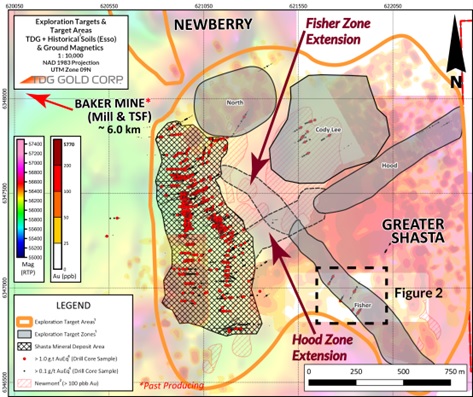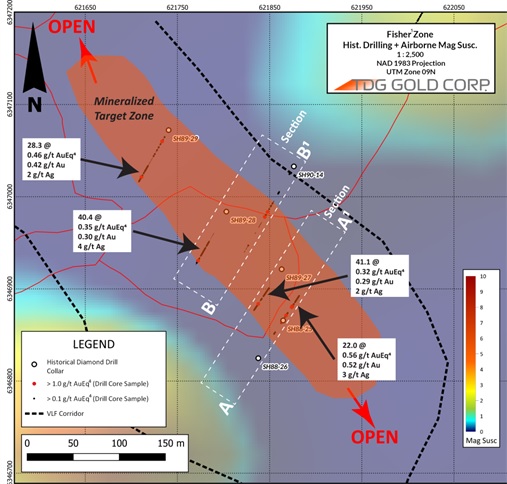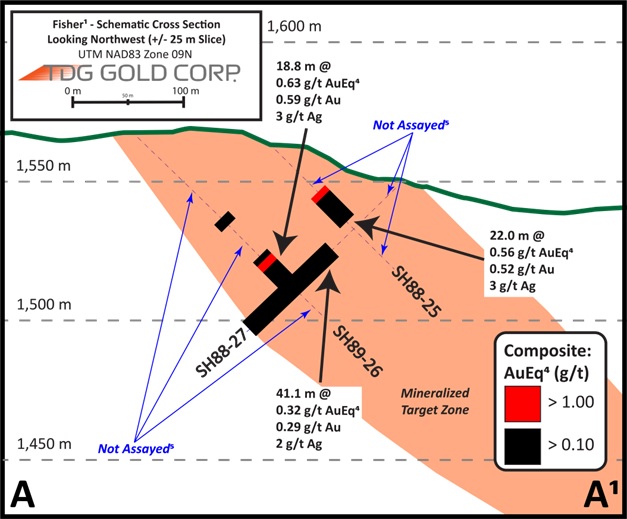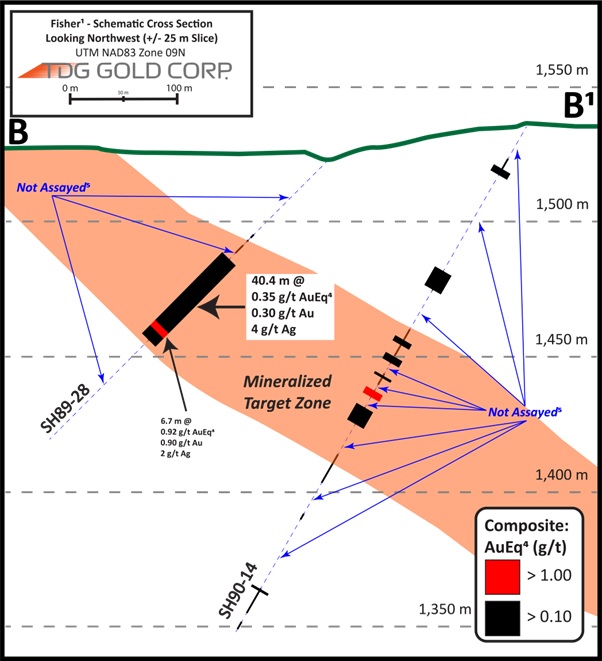WHITE ROCK, BC / ACCESSWIRE / April 6, 2023 / TDG Gold Corp. (TSXV:TDG) (the "Company" or "TDG") is pleased to provide a progress update from the ongoing recompilation work of historical data and information for the Fisher1 and Hood1 Zones: two of five higher priority exploration target zones located within TDG's recently defined ~6.5 square kilometer ("sq.km") Greater Shasta-Newberry exploration target area1 (Figure 1).
Seven historical diamond NQ drillholes2,3 were completed at the Fisher1 Zone (Figure 2) totalling ~818 metres ("m"). Holes SH89-27 and SH89-28 intercepted broad intervals of approximately 40 m of gold-silver ("Au-Ag") mineralization (see Table 1). In combination with the modern geophysical studies completed by TDG in 2022 and TDG's improved understanding of controls on mineralization at the Shasta deposit, TDG interprets that the historical drillholes completed at Fisher demonstrate potential continuity of mineralization (Figures 3 & 4) drilled at the edge of, and sub-parallel to, the geophysical target.
Two historical diamond NQ drillholes2,3 were drilled at the northeastern edge of the Hood1 Zone, outside of and parallel to, the geophysical feature. TDG interprets the Hood1 Zone to have the potential to connect to the eastern extremity of the Shasta deposit (Hood1 Zone Extension, Figure 1).
Steven Kramar, TDG VP Exploration, commented: "The Fisher and Hood Zones each extend for over 2 km with coincident gold-in soil anomalies and consistent geophysical features. The gold-silver mineralization intercepted by the historical drilling over ~40 m intercept core lengths in the Fisher Zone indicates potential for higher grade mineralization close by - as demonstrated historically in the Cody Lee Zone and through our modern diamond drilling at Shasta. The potential for connections between all the target zones at Greater Shasta-Newberry will be a focus for our exploration this field season."

Table 1. Historical2,3 Drill Results from the Hood1 & Fisher1 Exploration Target Areas
Hole |
Zone |
From |
To |
Length |
Au |
Ag |
AuEq4 |
(m) |
(m) |
(m) |
(g/t) |
(g/t) |
(g/t) |
||
| SH88-25* | Fisher |
24.0 |
46.0 |
22.0 |
0.52 |
3 |
0.56 |
incl. |
24.0 |
26.5 |
2.5 |
2.43 |
10 |
2.55 |
|
| SH88-26* | Fisher |
43.8 |
47.1 |
3.3 |
0.24 |
3 |
0.28 |
and |
63.1 |
81.9 |
18.8 |
0.59 |
3 |
0.63 |
|
incl. |
65.5 |
68.6 |
3.1 |
1.46 |
5 |
1.53 |
|
| SH89-27* | Fisher |
34.5 |
75.6 |
41.1 |
0.29 |
2 |
0.32 |
| SH89-28 | Fisher |
51.3 |
91.7 |
40.4 |
0.30 |
4 |
0.35 |
incl. |
85.0 |
91.7 |
6.7 |
0.90 |
2 |
0.92 |
|
| SH89-29* | Fisher |
63.6 |
91.9 |
28.3 |
0.42 |
2 |
0.46 |
incl. |
80.2 |
90.9 |
10.7 |
0.70 |
3 |
0.74 |
|
| SH90-08 | Hood |
No Significant Results |
|||||
| SH90-10 | Hood |
No Significant Results |
|||||
| SH90-12 | Fisher |
17.0 |
34.0 |
17.0 |
0.11 |
1 |
0.13 |
| SH90-14 | Fisher |
114.0 |
116.0 |
2.0 |
1.27 |
3 |
1.30 |
and |
121.1 |
127.5 |
6.4 |
0.48 |
1 |
0.50 |
|
* Drillhole ended in Au-Ag mineralization.
**Intervals are core-length weighted. True width and recovery are unknown.
***Composite results were built using a 0.1 g/t AuEq cut-off, although there may be intervals within the composite below 0.1 g/t AuEq.
****Calculated composites are truncated to significant 2 digits for Au/AuEq and the nearest whole number for Ag.
*****In cases where assay data was missing from historical records, concentrations were assigned a 0.00 value.

Fisher1 Zone
The Fisher1 Zone (Figure 2) is defined by a large northwest Au-in-soil anomaly coincident with a Very Low Frequency ("VLF-EM") corridor, inside a magnetic susceptibility low, similar to the Shasta deposit and the Cody Lee1 Zone (see TDG News Release April 03, 2023). The historically drilled portion of the Fisher1 Zone demonstrates continuity of Au-Ag mineralization across approximately 250 m of the ~2.5 kilometres ("km") strike length of the defined zone (Figure 1). The historically drilled portion along the mineralized trend used selective sample methods, only sampling target mineralization, and only ~ 40 % (by core length) of drill cores were assayed5, with several holes ending in mineralization (Table 1). There is no assurance as to whether or not the unsampled portions of the core are mineralized.


Hood1 Zone
The Hood Zone is defined by a large structural west-southwest lineament coincident with: (i) strong potassic alteration and quartz/carbonate veining), (ii) parallel Au-in-soil anomalous corridor, (iii) intense hydrothermal brecciation, (iv) parallel regional scale structure identified in physiography/landforms and Shasta deposit core and (v) gossanous colour anomaly along the trend. The Hood1 Zone appears to extend towards the JM Zone at the Shasta deposit and may be part of a larger regional feature. This interpretation would make the Shasta deposit contiguous with the Hood Zone, both occurring as potential discreet zones within the overall Greater Shasta-Newberry exploration target area and that appear interconnect - potentially as part of one larger feature.
Qualified Person
The technical content of this news release has been reviewed and approved Steven Kramar, MSc., P.Geo., Vice President, Exploration for TDG Gold Corp., a qualified person as defined by National Instrument 43-101.
1Mineral Exploration/Exploration Target Area(s): TDG is a mineral exploration focused company and the Company's Projects are in the mineral exploration stage only. The degree of risk increases substantially where an issuer's properties are in the mineral exploration stage as opposed to the development or operational stage. Exploration Targets and/or Exploration zones are speculative and there is no certainty that any future work or evaluation will lead to the definition of a mineral resource.
2Historical Data: This news release includes historical information that has been reviewed by TDG's qualified person (QP). TDG's review of the historical records and information reasonably substantiate the validity of the information presented in this news release; however, TDG cannot directly verify the accuracy of the historical data, including (but not limited to) the procedures used for sample collection and analysis. Therefore, any conclusions or interpretations borne from use of this data should be considered too speculative to suggest that additional exploration will result in mineral resource delineation. TDG encourages readers to exercise appropriate caution when evaluating these data and/or results.
3Historical Drill Core Sampling & Assay Methodology: Historical core was geologically logged with lithologies identified and notable geological features recorded. Historical core was cut in half (and in rare cases sawn in half) along sample intervals (lithology and mineralization dependant) generally less than 3 m. Chemical analysis was performed dominantly for precious metal analysis (Au, and Ag), and infrequently for base metals (Pb, Zn, Cu), and rarely for major elements and trace elements. Historically, different commercial laboratories were utilized in addition to an assay lab at Baker Mine Site. These lab facilities may or may not have had accreditation and in all cases accreditation (if applicable) pre-dated current ISO standards. Over that period, a variety of digestion and assay methods were used, including atomic absorption, fire assay atomic absorption, aqua regia atomic absorption and aqua regia ICP with varying detection limits. Reference materials (if any) were inserted at the analytical level and thus were unblind to the facility processing the samples.
4Gold Equivalent (AuEq): Gold Equivalent (AuEq) is used for illustrative purposes, to express the combined value of Au and Ag as a percentage of Au on an in situ basis. Calculations are uncut and recovery is assumed to be 90% for each metal with an Au price of US$1,800/oz and an Ag price of US$22.50/oz (based on trends over the past approximately three years), giving an 80:1 silver to gold ratio for AuEq calculation purposes. Actual prices and recoveries (following metallurgical test work) may differ from these assumptions, which would change the ratio.
5Unassayed Historical Drill Core: Historical drill core intersections, lengths or intervals referenced for re-assay or geological analysis may not be available or suitable for sampling. Historical drill cores were inherited with the project and TDG provides no guarantees or warranties that these drill cores are part of the historical inventory, are available and/or have not degraded to a state that would render them wholly unusable for the purposes of scientific investigation. TDG provides no warranties/guarantees that these historical un-assayed drill cores host precious or base metal mineralization.
About TDG Gold Corp.
TDG is a major mineral claim holder in the historical Toodoggone Production Corridor of north-central British Columbia, Canada, with over 23,000 hectares of brownfield and greenfield exploration opportunities under direct ownership or earn-in agreement. TDG's flagship projects are the former producing, high-grade gold-silver Shasta, Mets and Baker mines, which are all road accessible, produced intermittently between 1981-2012, and have over 65,000 m of historical drilling. The projects have been advanced through compilation of historical data, new geological mapping, geochemical and geophysical surveys and, at Shasta, over 13,000 m of modern HQ drill testing of the known mineralization occurrences and their potential extensions. In May 2022, an initial Mineral Resource Estimate was published for Shasta (see TDG news release May 17, 2022). In January 2023, TDG defined a larger exploration target area adjacent to Shasta (Greater Shasta-Newberry; see TDG news release January 25, 2023) with drill-ready targets where TDG aims to undertake follow-up exploration activity in 2023.
ON BEHALF OF THE BOARD
Fletcher Morgan
Chief Executive Officer
For further information contact:
TDG Gold Corp.,
Telephone: +1.604.536.2711
Email: info@tdggold.com
Neither TSX Venture Exchange nor its Regulation Services Provider (as that term is defined in the policies of the TSX Venture Exchange) accepts responsibility for the adequacy or accuracy of this release.
Forward-Looking Statements
This news release contains forward-looking statements that are based on the Company's current expectations and estimates. Forward-looking statements are frequently characterized by words such as "expand/expansion", "coincident", "interpret/interpretation", "demonstrate/demonstrated", "appears", "connect/connections", "potential/potentially", "project", "continuity", "extend/extension", "anticipate", "estimate", "suggest", "indicates", "support", and variations of these words as well as other similar words or statements that certain events or conditions "could", "may", "would" or "will" occur. Such forward-looking statements involve known and unknown risks, uncertainties and other factors that could cause actual events or results to differ materially from estimated or anticipated events or results implied or expressed in such forward-looking statements. Such factors include, among others: the actual results of current and planned exploration activities; the interpretation of the Fisher and Hood Zones as representing a potential mineralized trend, and the potential for extensions to the Fisher and Hood Zones; the interpretation that the Greater Shasta-Newberry Target Area represents a larger mineralized system encompassing several target zones; the results of planned geophysical and geochemical studies planned for 2023; as well as the results of re-logging and resampling of historical core; conclusions of future economic evaluations; changes in project parameters as plans to continue to be refined; possible variations in grades of mineralization and/or future actual recovery rates; accidents, labour disputes and other risks of the mining industry; the availability of sufficient funding on terms acceptable to the company to complete the planned work programs; delays in obtaining governmental approvals or financing; and fluctuations in metal prices. There may be other factors that cause actions, events or results not to be as anticipated, estimated or intended. Any forward-looking statement speaks only as of the date on which it is made and, except as may be required by applicable securities laws, the Company disclaims any intent or obligation to update any forward-looking statement, whether as a result of new information, future events or results or otherwise. Forward-looking statements are not guarantees of future performance and accordingly undue reliance should not be put on such statements due to the inherent uncertainty therein.
SOURCE: TDG Gold Corp.
View source version on accesswire.com:
https://www.accesswire.com/747905/TDG-Gold-Corp-Reports-Historical-Drill-Results-From-Fisher-Hood-Zones-That-Support-Potential-of-Greater-Shasta-Newberry-Exploration-Target-Area-Toodoggone






